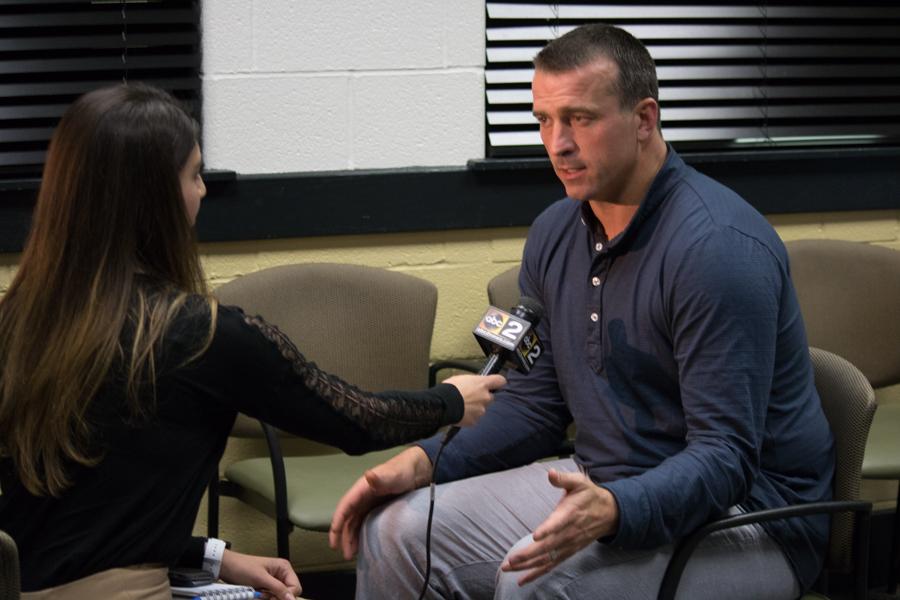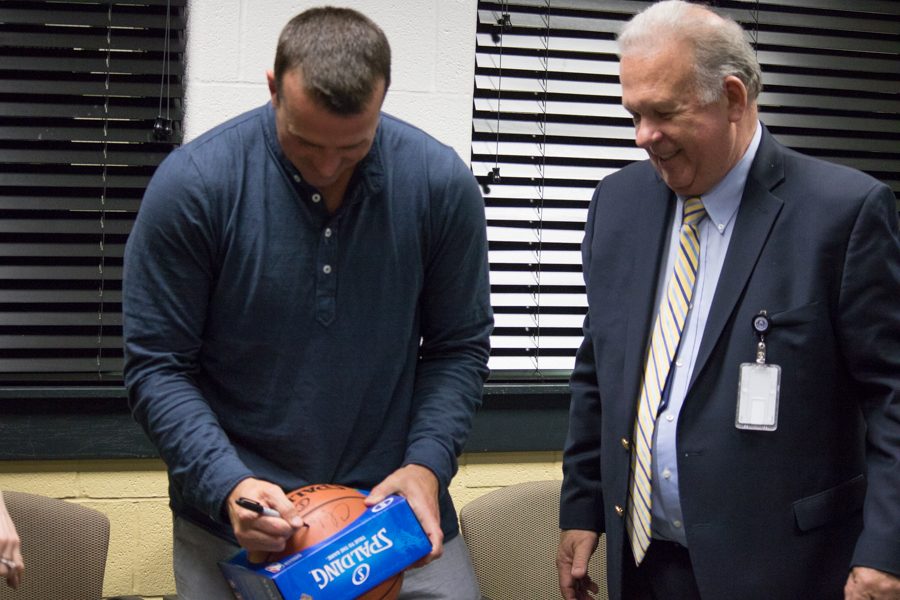Recovering addict inspires community
Chris Herren, former NBA player and recovering drug addict, came to JC on May 18 to discuss his experiences overcoming his addiction to oxycontin and heroin. Community members remain shocked and inspired from his message.
Former NBA player Chris Herren signs memorabilia for local students before his presentation. The Harford County Sheriff’s Department organized an event on May 18 to fight the “heroin epidemic” in our county according to Bel Air Chief of Police Charles Moore.
On May 18, former NBA player and recovering drug addict, Chris Herren, came to JC and spoke about his long fight and hard-won battle with addiction. In an attempt to combat the heroin epidemic raging across not only our county but our state, the Harford County Sheriff’s Office organized this event and showed members of the community that addiction can be beaten.
While Herren’s story of the horrors of drug abuse was in itself a preventative measure, his speech focused primarily on the ability for anyone to overcome addiction.
“My message is my story, and the devastation that drugs do to families and the ability to overcome and move forward from addiction,” Herren said. His message hinges on his personal experiences with overcoming an oxycontin and heroin addiction, but his candor brought a new perspective to the message that resounded with those in the audience.
With a clenched jaw and woeful eyes, Herren told the story of how he fell prey to addiction and how he recovered with the help of his family, a handful of special strangers, and divine intervention.
Herren’s struggle began in high school, when he first started drinking and smoking with friends, but followed him to college. Herren attended Boston University, where he had been recruited to play basketball.

ABC2 News reporter Mallory Sofastaii interviews Chris Herren during a press conference. Herren came to speak at John Carroll about his recovery from addiction on May 18.
Herren tried cocaine, his first hard drug, in his college dorm, forever changing the trajectory of his life and basketball career. “I thought ‘I’ll get this over with. I’ll do it this one time and never again. Little did I know that one line would take 14 years to walk away from,” he said.
After becoming addicted to cocaine and failing several drug tests, Herren was expelled from Boston University and sent to a rehabilitation facility. After staying clean for several months and rebuilding his basketball career, Herren was introduced to oxycontin and spiraled back down into the pits of addiction.
By the time Herren was contracted to play basketball for the Boston Celtics, he was dependent on oxycontin to just survive the day. After being offered a job to play basketball overseas, Herren developed a heroin addiction and had his first overdose.
“My first phone call [after being released from jail after overdosing on heroin] wasn’t to my wife. It was to the man in the parking lot who had sold me the heroin because what he had sold me was so good that it almost killed me,” Herren said.
After his fourth overdose and being kicked out by his wife, Herren turned his life around and has been sober since August 1, 2008. “I’ve accomplished so much in my life, but nothing feels better than being sober,” he said with a smile.
His message was not only a source of inspiration to many individuals in the audience of over 900 people, but a story that was almost spookily similar to their own. “I know that a lot of the people in the audience tonight will be probably be dealing with addiction,” Harford County Executive Barry Glassman said.
Glassman’s prediction was not far off. The audience was made up almost entirely of those fighting to stay clean, according to junior Lauren Christensen, whose brother has been sober for a year and plays an active role in local Alcoholics and Narcotics Anonymous meetings.
“All those people that went, I knew so many people that were struggling. All the people sitting in the bleachers and the majority in the crowds [all struggled with some sort of addiction],” Christensen said.
When Herren opened up the floor for a series of questions and answers, members of the audience stood up and shared their experiences with sobriety, and their testimonials proved Glassman and Christensen’s theories undeniably correct. One audience member explained that he was ten days clean, while others explained they had been in recovery for years.
“Hopefully this will be a source of inspiration for those in recovery. To see someone who has been down that road and has beaten addiction is an important beacon of hope,” Director of Governmental and Community Relations Cindy Mumby said. According to Mumby, those involved with the event hope that Herren’s talk will provide those fighting addiction with another source of motivation and inspiration.
While Herren wants to help all those struggling with addiction, he feels that making an impact on only one person is still a success. “If I can help one person feel like someone understands them, or make one person question whether they should be better than they are today, then I’ll be happy,” he said.
Christensen, who has seen drugs wreak havoc on her brother’s life, believes that his message accomplished that goal. She felt that Herren’s story had an astounding impact on the audience and on herself. “Hearing [Herren’s] story gives people hope that they’re not going through this alone, there are other people out there in the same circumstances as them,” Christensen said.
Grace Mottley is a News Editor for The Patriot and jcpatriot.com.



